EU is asking Europe to take in 160,000 refugees, with binding quotas
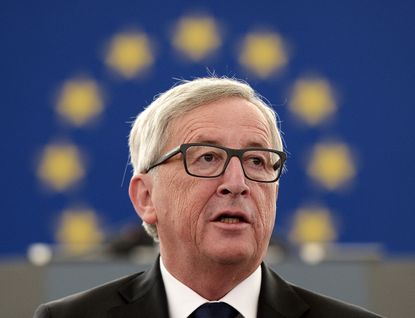

On Wednesday, in his first State of the European Union address, European Commission President Jean-Claude Juncker asked for European governments to accept 160,000 refugees, spreading out the mass migration from Syria and other violence-torn regions through binding quotas. "The bell tolls, the time has come," he said. "We have to look at the huge issues with which the European Union is now confronted," because Europe's future depends on it.
Juncker, who manages the EU's day-to-day affairs, requested that the quota system, and a plan to quickly send home migrants not accepted for asylum, be formally approved at a Sept. 14 meeting of member states' home ministers. A majority of EU nations have to approve the rules, and approval won't be unanimous. Juncker's proposal envisions distributing the 160,000 refugees mostly stuck in Greece, Hungary, and Italy over two years, with individual quotas to be determined later.
The plan will face stiff resistance from countries like Hungary whose governments want to keep the flood of migrants out of Europe. Juncker argued that the young migrants will actually help Europe's economy by bolstering its aging workforce. "Europe today is an island of hope for the people in the Middle East fleeing war and oppression," he said. "This is something to be proud of, not something to fear."
Subscribe to The Week
Escape your echo chamber. Get the facts behind the news, plus analysis from multiple perspectives.

Sign up for The Week's Free Newsletters
From our morning news briefing to a weekly Good News Newsletter, get the best of The Week delivered directly to your inbox.
From our morning news briefing to a weekly Good News Newsletter, get the best of The Week delivered directly to your inbox.
Create an account with the same email registered to your subscription to unlock access.
Sign up for Today's Best Articles in your inbox
A free daily email with the biggest news stories of the day – and the best features from TheWeek.com
Peter has worked as a news and culture writer and editor at The Week since the site's launch in 2008. He covers politics, world affairs, religion and cultural currents. His journalism career began as a copy editor at a financial newswire and has included editorial positions at The New York Times Magazine, Facts on File, and Oregon State University.
-
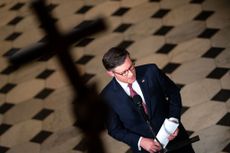 'A speaker courageous enough to stand up to the extremists in his own party'
'A speaker courageous enough to stand up to the extremists in his own party'Instant Opinion Opinion, comment and editorials of the day
By Harold Maass, The Week US Published
-
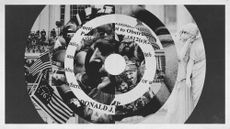 How could the Supreme Court's Fischer v. US case impact the other Jan 6. trials including Trump's?
How could the Supreme Court's Fischer v. US case impact the other Jan 6. trials including Trump's?Today's Big Question A former Pennsylvania cop might hold the key to a major upheaval in how the courts treat the Capitol riot — and its alleged instigator
By Rafi Schwartz, The Week US Published
-
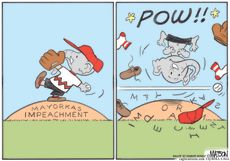 Today's political cartoons - April 18, 2024
Today's political cartoons - April 18, 2024Cartoons Thursday's cartoons - impeachment Peanuts, record-breaking temperatures, and more
By The Week US Published
-
 Puffed rice and yoga: inside the collapsed tunnel where Indian workers await rescue
Puffed rice and yoga: inside the collapsed tunnel where Indian workers await rescueSpeed Read Workers trapped in collapsed tunnel are suffering from dysentery and anxiety over their rescue
By Sorcha Bradley, The Week UK Published
-
 More than 2,000 dead following massive earthquake in Morocco
More than 2,000 dead following massive earthquake in MoroccoSpeed Read
By Justin Klawans Published
-
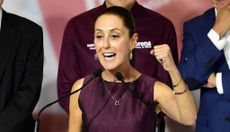 Mexico's next president will almost certainly be its 1st female president
Mexico's next president will almost certainly be its 1st female presidentSpeed Read
By Peter Weber Published
-
 North Korea's Kim to visit Putin in eastern Russia to discuss arms sales for Ukraine war, U.S. says
North Korea's Kim to visit Putin in eastern Russia to discuss arms sales for Ukraine war, U.S. saysSpeed Read
By Peter Weber Published
-
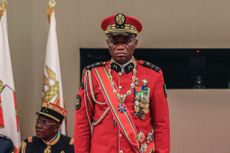 Gabon's military leader sworn in following coup in latest African uprising
Gabon's military leader sworn in following coup in latest African uprisingSpeed Read
By Justin Klawans Published
-
 Nobody seems surprised Wagner's Prigozhin died under suspicious circumstances
Nobody seems surprised Wagner's Prigozhin died under suspicious circumstancesSpeed Read
By Peter Weber Published
-
 Western mountain climbers allegedly left Pakistani porter to die on K2
Western mountain climbers allegedly left Pakistani porter to die on K2Speed Read
By Justin Klawans Published
-
 'Circular saw blades' divide controversial Rio Grande buoys installed by Texas governor
'Circular saw blades' divide controversial Rio Grande buoys installed by Texas governorSpeed Read
By Peter Weber Published